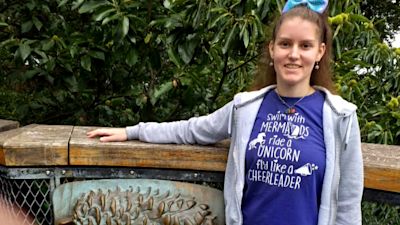North Yorkshire woman says misdiagnosis and care failings ‘destroyed' her autistic daughter

The mother of an autistic woman who took her own life in June 2020 has told ITV News Tyne Tees a misdiagnosis by the clinicians who were responsible for caring for her daughter "destroyed her".
It comes after a coroner concluded care failings at the Tees, Esk and Wear Valleys NHS Foundation Trust had "contributed" to the 25-year-old's suicide.
The NHS Trust told the inquest it had made "improvements" to its care for autistic people since Zoe Zaremba's death.
Ms Zaremba's mother, Jean Zaremba, said she was delighted with the inquest conclusion, stating Zoe just could not live with the misdiagnosis of a personality disorder.
She said: "It just destroyed her. She just said she couldn’t live in a world full of liars and what was the point? And it really shocked her that people would write lies and it would say lies and it would be believed, but she would tell the truth and it wasn’t.
"She’s asked for help. She’s done the right things and she asked questions too and nobody answered. They stonewalled her completely. She was desperate, but mental health services destroyed her and this is the outcome of their lack of understanding or wanting to understand."
Zoe Zaremba went missing in Aiskew, North Yorkshire in June 2020. A week later her body was found under a hedgerow after she had taken her own life.
North Yorkshire assistant coroner, John Broadbridge, concluded Zoe Zaremba died because of suicide. Her death, he said, "was contributed to by the actions and inactions by clinicians within a care system that was underdeveloped to manage an autistic individual with complex needs".
Mr Broadbridge outlined several failings, which had previously been highlighted in an independent review of Zoe's death, including the finding that there was "limited understanding of autism" from those involved in Ms Zaremba's care.
The coroner also found the NHS Trust:
Failed to assign a care co-ordinator for Ms Zaremba
Failed to implement an effective care plan
Failed to amend the misdiagnosed personality disorder on her clinical notes in a timely manner.
He concluded that these "systemic failings" in her care led to a mistrust from Ms Zaremba in the clinicians and a disengagement with the mental health service and therefore contributed to her suicide.
Her mother said: "I always knew they had. It’s just, for me, it’s good to have it out there on the public record. They had no intention of helping her. She never got a care co-ordinator. They wrote it in her notes that she had one, but she never had one."
Elizabeth Moody, director of nursing and governance at Tees, Esk and Wear Valleys NHS Foundation Trust, said: "We know this will have been an incredibly difficult week for Zoe’s family and friends. We are truly sorry for their loss.
"While we have made improvements to our services to better support autistic people and their families and carers, there is still more we must do.
"In such difficult circumstances, we are hugely grateful to Zoe’s family for working closely with us to embed a deeper understanding of autism and the adjustments that may be needed to support autistic people to access our services."
The coroner said he will write a report with his recommendations following the inquest and send it to the health minister for care and mental health, Gillian Keegan, NHS England and the North Yorkshire Clinical Commissioning Group in the hope it will help modify the way people with autism are cared for and ultimately prevent further deaths.
Jean Zaremba said she wanted her daughter's case to be remembered so it prevents other autistic people going through what Zoe went through.
She said: "I would like Zoe’s legacy to be that mental health professionals understand autism more, help autistic people that are suffering with mental health issues as well - especially autistic females - understand the presentation and listen to the patient."